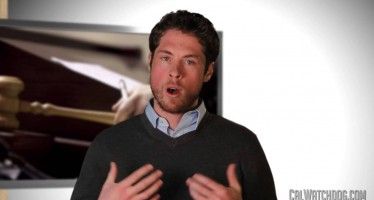California's New Depression
By JOHN SEILER
As California approaches a new year, with a new governor and other statewide officers, it’s worth reviewing what I call “California economic realities.” These are the factors which, at all levels, affect the state’s economy, from the state treasury and venture capitalists at the top, to the unemployed and destitute at the bottom.
New Depression?
Today the U.S. Labor Department reported that in November unemployment rose to 9.8 percent, up from 9.6 percent in October. The “summer of recovery” that Vice President Joe Biden promised us never happened. The Wall Street Journal Reported:
The U.S. unemployment rate has now been above 9% since May 2009, or 19 months. That matches the longest stretch at such an elevated level since World War II. In the deep recession of the early 1980s, the jobless rate crept to 9% in March 1982 and remained above that mark until September 1983.
Great Recession? How about New Depression.
So there’s no help forthcoming from a national or global economic boom, such as those that lifted California out of recessions in the early 1990s and early 2000s. There’s no dot-com boom or real-estate boom on the horizon to sharply raise the tax base and so vastly increase state tax revenues.
Highest unemployment rate?
Soon, California also could have the nation’s highest rate of joblessness, a dubious honor.
California’s unemployment rate has been stuck above 12 percent for all of 2010. It was 12.4 percent in October, the third worst in the nation, and likely will rise for November when those state-level figures are released later in the month. It was just behind the 12.8 percent of perennially depressed Michigan, whose economy has been improving with the auto industry.
Michigan just elected a Republican governor, Rick Snyder, and Republican majorities in both houses of the Great Lake State’s Legislature, meaning they likely will enact pro-business reforms including tax cuts and regulation reform.
Nevada just elected reform Republican Brian Sandoval as governor; in June, he defeated the establishment Republican sitting governor, Jim Gibbons. (Unlike the California GOP, Nevada Republicans have found out how to nominate Latinos who win.) Sandoval recently promised to hunt around the country, including California, for businesses to come to Nevada, whose biggest attractions are no income tax and rock-bottom real estate prices after the recent crash. After his election, Sandoval said on Nov. 12:
I think we have a great opportunity to bring new businesses from the states of California and Oregon where they’ve chosen to raise taxes and where they over-regulate. And so there are a lot of prospects out there. In fact I’m already beginning to make phone calls in terms of businesses that are looking at the state of Nevada to tell them that we have a very strong business environment. That this is a great place to live.
That zero percent income tax rate is highly attractive. And for wealthy executives, while Nevada’s hot desert isn’t as attractive as California’s balmy coast, a half-hour jet ride from Vegas brings them to a beach house on weekends.
National economy
California’s politicians like to boast how the state is “the world’s eighth largest economy,” as Gov. Arnold Schwarzenegger did many times, as in his 2009 State of the State address. In fact, California is but a sub-unit of the American economy, which itself operates in the fiercely competitive environment of the global economy.
In his Nov. 19, 2010 weekly address, Schwarzenegger boasted about how “sub-national governments” were leading the way on environmental action that would “slowly get up to the federal government.” He also boasted about his Governors’ Global Climate Summit 3, at U.C. Davis on Nov. 15 and 16.
But that just isn’t happening. The Associated Press reported on Dec. 1 that incoming House Republicans, the new leaders of Schwarzenegger’s own party, are going to kill the House Global Warming Committee. Aside from the governor, Republicans across the country are reading the tea leaves — as in the Tea Party. Reported the Oct. 20 New York Times:
Skepticism and outright denial of global warming are among the articles of faith of the Tea Party movement, here in Indiana and across the country. For some, it is a matter of religious conviction; for others, it is driven by distrust of those they call the elites. And for others still, efforts to address climate change are seen as a conspiracy to impose world government and a sweeping redistribution of wealth.
Not many Republicans across America care anymore about an unpopular outgoing governor’s obsessions.
Moreover, any Republican president that might win in 2012 likely will be a global-warming skeptic.
Which means that Schwarzenegger’s hope that his legacy in California will “slowly get up to the federal government” will be in vain. That leaves the state alone to deal with the economic effects of his AB32, the 2006 Global Warming Solutions Act.
Global economy
As well as being an integrated part of America’s vast economy, California also swims in a global economy. California long has been the world leader in innovation. Silicon Valley computer geeks, Irvine’s medical devices industries and Orange County’s computer switching devices still dominate international markets.
But during the Great Recession, innovation capital leadership has shifted from America and California to China. Reports the Huffington Post:
On Wednesday, the World Intellectual Property Organization (WIPO) said that patent applications in China jumped 18.2 percent in 2008 and another 8.5 percent in 2009. Over the same period, ZTE, China’s second-largest telecom equipment maker, boosted R&D spending 44.8 percent.
In the U.S., patent filings fell 11.7 percent in 2008 and 2009, while companies like General Motors, Hewlett Packard and Microsoft slashed their R&D budgets by more than 20 percent from 2008 to 2009. In Europe and Japan new patent filings dropped 7.9 and 10.8 percent, respectively, in 2009.
“China is moving up the value chain and rapidly increasing exports based on domestic innovation, so inevitably it is filing an ever-growing number of patent applications,” WIPO’s Chief told a news conference as the agency announced its latest findings.
Schwarzenegger and others have boasted how AB32 will promote green jobs creation in California, catapulting us into world leadership. But China already leads the world in solar-panel production. It will be happy to help Californians prevent global warming by selling its panels here.
And assuming the bullet-train ever is built in California, the trains running on its tracks will be designed in China, although most of the assembly will be in America.
AB32 digs in
Next year also will see the first strong implementation of AB32. During the election’s debate over Proposition 23, which would have suspended AB32 until unemployment dropped to 5.5 percent, a lot of numbers were tossed around. The Union of Concerned Scientists said AB32 could create 112,000 jobs while saving half a million.
By contrast, a Cal State-Sacramento study found that AB32 could kill up to 1.1 million jobs.
We’ll soon find out which projection is right. But it goes against economic reality to think that a stiff new regulation will create jobs instead of destroying them. As Joseph Vranich, the Business Relocation Coach, has tallied, at least 158 businesses already have left California in 2010, a new record. Next year could be even worse.
Voters to business: drop dead
It isn’t just what voters did by rejecting Prop. 23 that will be so damaging to the economy. It’s also the impression they give global investors that the voters are anti-business.
Nobody knows what new anti-business legislation will be passed by the Legislature and signed by Gov. Jerry Brown. Nor does anybody know what new anti-business initiatives will be put on the ballot and approved by voters.
True, voters also made it harder to raise the taxes called “fees” by passing Proposition 26. And voters defeated the Proposition 24 tax increase. Those are positives. But taxes in California already are so high that limiting new increases is only a slight improvement. And we have yet to see what tax increases will be attempted by the new governor and Legislature to try to deal with the $25 billion state budget deficit that Schwarzenegger leaves behind.
Tax havens
As companies and persons deal with the continuing American calamity, they will seek havens wherever they can. Which means they will be looking for states with the lightest tax burdens.
California’s tax burden, among the highest of the 50 states, will encourage businesses and jobs to leave, while discouraging them from coming here. During good times, businesses can overlook high taxes in some cases because prosperity electrifies everything, and California’s charms are alluring.
But during bad times, especially economic bad times that never seem to go away, businesses can only take so much of a tax burden before facing the choice between leaving and bankruptcy.
$25 billion budget deficit
That $25 billion budget deficit is just scary. Worse, the optimism that seven years ago greeted Schwarzenegger and his promise to stop the “crazy deficit spending” long has deflated the way his muscles did when he stopped injecting himself with steroids. In 2003, it was easy to see the problem as one of an incompetent, panicky Democratic governor, Gray Davis, who just had to be removed.
But in 2010 it seems as if no one, Democrat or Republican, American-born or Austrian-born, can solve the endemic deficits. Even the Terminator didn’t terminate them, but made them worse. Yet they must be solved. California, unlike the federal government, cannot just print money to paper over debt.
The Jerry factor
Enter Jerry Brown, the once and future governor. In a recent Orange County Register column, Brian Calle writes that Brown has a chance for a “Nixon going to China” moment. That would mean he would face down the people who put him into office, the government workers’ unions, and work for major spending cuts and essential pension reforms. Calle:
The state’s government employee unions will be Brown’s biggest obstacle. “They will resist efforts to curtail compensation, pension and fringe benefits,” [former Republican Gov. George] Deukmejian warned. To be successful he will have to address public employee compensation. “Since he [Brown] is not looking to run for president this time, or, perhaps, even a second term as governor, maybe he wants to address the real problems.” But Deukmejian also warned that unions become more brazen the longer a governor is in office. “Gray Davis steered state economic policy down the middle of the road very effectively his first couple of years, and then unions stepped in and we saw the results.”
Deukmejian said that for Brown to be successful he will have to be “willing to resist many efforts to spend more than the state has coming in. It is really that simple but it is not easy to do, and to accomplish it he will have to wield his veto power.”
But even Brown will have difficulty pushing reforms through a new Legislature as much controlled by left-wing Democrats as the outgoing Legislature. Redistricting, which is supposed to end the gerrymandering that encouraged extremist left-wing candidates, doesn’t take effect until the 2012 election.
Grand illusion
Add it all up, and California is living a Grand Illusion. Other states are positioning themselves to weather whatever storms come next in the Great Recession by cutting taxes and regulations. That is, by facing reality.
Meanwhile, California policymakers and voters believe that they way to prosperity is overspending, overborrowing, overtaxing and overregulating.
Soon, California is going to learn the hard way the truth of old Ben Franklin’s aphorism, “Experience keeps a dear school, yet Fools will learn in no other.”
John Seiler is an analyst and researcher at CalWatchDog.com. His email: [email protected].
Related Articles
Video: Can closing down public pensions save California?
March 1, 2013 CalWatchDog.com writer John Hrabe explains how public-employee unions continue to fight pension reform in San Diego:
If GOP Fails, 3rd Party Will Rise
OCT. 28, 2010 By JOHN SEILER Rep. Dana Rohrabacher, R-Huntington Beach, has taken a long, strange journey to veteran status
Is California the next Detroit?
Editor’s Note: CalWatchdog.com has been following Detroit’s economic situation for several years, and in light of its recent filing for Chapter





